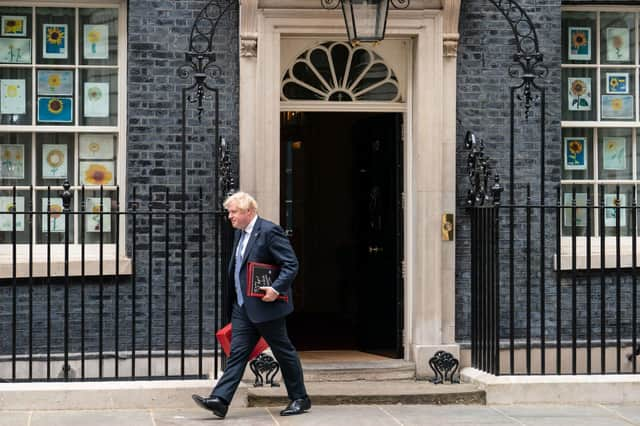Owen Polley: Unionists should be wary of the idea that the exit of Boris Johnson would help Northern Ireland


Last week, the senior civil servant, Sue Gray, published her long-awaited report into lockdown breaches at Number 10.
The document contained some lurid details, but, largely, it confirmed what we already knew.
Advertisement
Hide AdAdvertisement
Hide AdAlongside the long hours and high pressure that come with working at Downing Street, there was a culture of socialising at work and disregarding rules on social distancing during Covid.
The prime minister and other senior politicians were aware of this way of working and occasionally participated in the events that have since become infamous.
There is now a fierce debate about whether this matters enough for Boris Johnson to lose his job.
A Conservative leadership election will take place if 54 Tories submit letters of ‘no confidence’ to the 1922 Committee of backbench MPs.
Advertisement
Hide AdAdvertisement
Hide AdThe total is currently thought to stand somewhere between 40 to 50, with the Daily Telegraph reporting party sources who say that the threshold could be met ‘at any time’.
About the only thing we can tell for certain at the moment is that the ‘partygate’ revelations will eventually make for an entertaining television drama.
The report was full of vivid and sometimes mournful vignettes of the type filmmakers love. Like the online Christmas quiz, joined by five staff in the press office, that culminated in an hour long game of Articulate; or the leaving do, on the eve of Prince Philip’s funeral, that ended with employees breaking the PM’s child’s swing.
Boris’s fate will not be decided by these minutiae, which seem almost comically trivial now that lockdown has ended. But the Conservatives are worried that the report exacerbates concerns about the prime minister’s honesty, because he assured the House of Commons that no regulations were broken, or that it contributes to the public’s sense that this government lacks direction.
Advertisement
Hide AdAdvertisement
Hide AdIt is easy for Tory MPs and strategists to ignore criticism from Labour and other opponents, but, ultimately, they will not disregard the opinion polls. The latest surveys show that a majority of people want Johnson to resign and the New Statesman’s modelling suggests that the party could lose up to 112 seats at the next general election.
The PM’s former communications chief, Will Walden, was among several pundits who predicted that the Conservatives are ‘sleepwalking’ toward an electoral disaster.
To counter this perception and try to change the polling numbers, on Thursday the chancellor, Rishi Sunak, unveiled plans to help families with their Winter fuel bills. The government is desperate to move the agenda on to other issues, and that is specifically relevant to Northern Ireland and our struggle to remove the Irish Sea border.
The BBC’s Nolan Show claimed last week that the foreign secretary, Liz Truss, will now introduce legislation to tackle the protocol as early as June 6. There are also suggestions that it may be given ‘accelerated passage’ through parliament, in order to get it on the statute book as quickly as possible and potentially encourage the DUP to return to the executive.
Advertisement
Hide AdAdvertisement
Hide AdThe government has still not published the details of its proposed bill. Whenever it does, the pro-Union parties will have to decide rapidly, not only whether it removes trade barriers effectively, but also if it dismantles the EU’s legal authority over NI and solves the main constitutional problems created by the protocol.
This legislation may not, in the end, deal with these issues to the satisfaction of unionists, but, at the moment, it is the only route that promises a solution.
There are nearly a limitless number of reasons for pro-Union people here to distrust Boris Johnson and his government, based on previous experiences. At the same time, a change of administration, or even a new Tory leadership, would not necessarily improve our chances of restoring Northern Ireland’s place in the Union and the UK internal market.
The most ardent Conservative Brexiteers have exploited and neglected Ulster unionism badly, but many figures to the left of the party have seemed worryingly gullible, when it comes to Dublin’s claims and Irish nationalist propaganda. Influential MPs, like the Northern Ireland select committee chair Simon Hoare, have remained oblivious to unionists’ arguments, while parroting lines that could have come straight from the SDLP or the southern Department of Foreign Affairs.
Advertisement
Hide AdAdvertisement
Hide AdAnd if some pro-Union politicians here hoped for better treatment from the Labour party, they would have been appalled at the way that Mary-Lou McDonald and Michelle O’Neill were greeted like conquering heroes by some of its politicians last week.
The current Conservative government, and the prime minister, may be lurching from one crisis to the next and their credibility may be damaged irreparably. But unionists should be suspicious of the idea that their early downfall would necessarily benefit Northern Ireland.